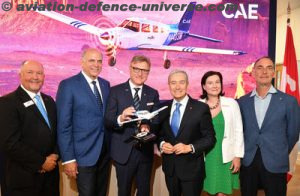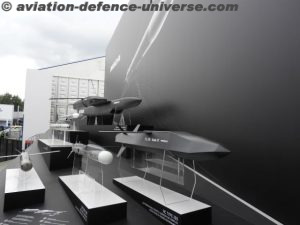- CAE and Piper to work on development and commercialization of the technology
- H55 to provide the aircraft battery system
- SAFRAN to supply ENGINeUSTM 100 electric smart motor
Farnborough. 19 July 2022. CAE announced that it has partnered with Piper Aircraft to develop a conversion kit via a Supplemental Type Certificate (STC) for in-service Piper Archer® (PA-28-181) aircraft and bring an electric variant option of the iconic aircraft to market.

CAE expects to convert two-thirds of its Piper Archer® training fleet and develop a curriculum for new pilots to train on the operation of electric aircraft. CAE is bringing together industry leaders from Canada, the United States, and Europe to develop an aircraft that will reduce carbon emissions and noise levels at its flight schools around the world, while training future pilots to operate electric aircraft.
CAE and Piper Aircraft intend to work together on an electrical conversion kit for third parties, along with training and support services required for the operation of electrified Piper Archer® aircraft.
Executives from CAE, Piper Aircraft, and project partners joined the Honourable François-Philippe Champagne, Canada’s Minister of Innovation, Science and Industry as well as Pierre Fitzgibbon, Quebec’s Minister of Economy and Innovation for the announcement.
“Piper Aircraft has been a longstanding trusted partner for CAE’s flight training operations, and we are very pleased to have them join us, along with other electric aviation leaders, in this leap forward for the sustainable future of aviation.” said Marc Parent, CAE’s President and CEO.
“The development of this technology is a first for CAE. As an engineering powerhouse and one of the largest Piper Archer® operators, CAE is uniquely positioned to make electric-powered flight a reality at our flight schools and beyond. CAE’s partnership with the Government of Canada and the Government of Quebec for investment into R&D has enabled us to boldly look to the future and prepare our electric aircraft for take-off,” added Parent.
“Piper Aircraft is excited to support CAE’s development of an electric aircraft modification conversion kit for the Piper Archer®”, said Piper Aircraft President and CEO, John Calcagno. “With 28,000 aircraft in global service, the PA-28 is the ideal platform for real world flight training curriculums and professional pilot training programs like CAE’s. Piper Aircraft is focused on aviation’s commitment to greenhouse gas reductions and as such, we look forward to collaborating with CAE on the integration of an electric propulsion system for the Piper Archer®.
H55 battery packs
H55 of Switzerland is set to provide the battery system. H55 is one of the leading aerospace battery and propulsion system suppliers with years of successful electric flight experience, including the technology used in all of the Solar Impulse airplanes. In addition to developing clean propulsion technologies, battery packs and energy management solutions for new airplanes, H55 is also active in transforming existing designs. The path to clean aviation, will only be accelerated by the fact that this project brings H55 together with a leading aerospace technology company and an experienced aircraft manufacturer.
Safran ENGINeUSTM 100 electric smart motor
CAE is also engaging with Safran Electrical & Power, to incorporate the new ENGINeUSTM 100 electric smart motor into the STC conversion kit. The ENGINeUSTM 100 delivers 150 kW maximum at take-off power and features a fully integrated motor controller within the machine. The thermal management is provided by an optimized air-cooling system. The new industry leading motor is aligned with CAE’s flight training operating requirements.
Safran Electrical & Power is a global leader in aircraft electrical systems. The company has extensive capabilities, comprehensive portfolio and broad expertise to provide its customers with solutions for electric powertrains and equipment electrification.
Canada Quebec Aerospace Cluster
The development of the electric conversion kit is part of Project Resilience through which CAE is investing C$1 billion in innovation over five years in partnership with the Government of Canada and the Government of Quebec to develop aviation and cross-sectoral digital technologies of the future. CAE will draw on the expertise of Canada’s strong Aerospace cluster and will collaborate and co-develop technology solutions with OEMs, small and medium sized companies, post-secondary institutions, and research centers from across Quebec and Canada.
“Canada is leading the world when it comes to the innovation required for the low carbon economy. Thanks to our government’s recent support of CAE, not only will we see 700 new jobs in Canada, today’s announcement means we will see green and clean aircraft technologies that will be used all over the world,” said the Honourable François-Philippe Champagne, Minister of Innovation, Science and Industry.
“CAE understands that the aerospace industry needs to shift to reducing its environmental footprint through new technology. This is the type of project we intend to support so they can develop innovative solutions that will make air transportation more electric,” said Pierre Fitzgibbon, Minister of Economy and Innovation and Minister Responsible for Regional Economic Development.
CAE’s commitment to carbon neutrality
In 2020, CAE became the first Canadian aerospace company to be carbon neutral, compensating for its direct GHG emissions (scope 1), electricity indirect GHG emissions (scope 2) and emissions related to business travel by plane (partial scope 3) with a view to further reduce its overall carbon footprint.
CAE is committed to being a sustainability leader through the development green aviation technology and existing corporate initiatives like the use of 100-percent renewable energy for electricity at its facilities around the world through the energy generated on site and the purchase of Renewable Energy Credits (RECs). Furthermore, CAE is actively developing solutions aligned with Canada’s newly implemented Clean Technology Key Industrial Capability.































































































































